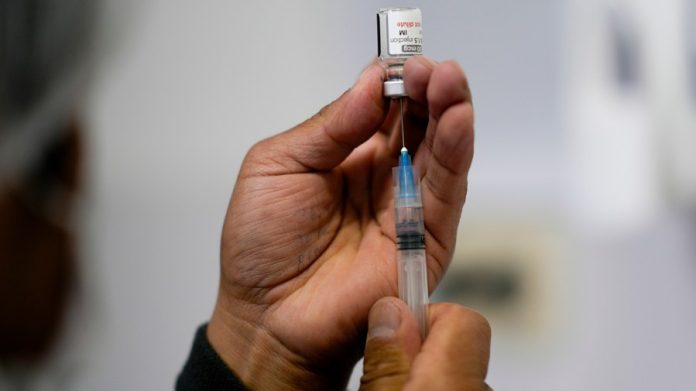
The Food and Drug Administration is considering revoking the authorization of Pfizer’s COVID-19 vaccine for healthy children under 5 years old, a move that would add another barrier for parents who want to vaccinate healthy children ahead of the respiratory virus season.
Pfizer’s three-dose shot for children between 6 months and 5 years old has long been available under an emergency use authorization (EUA). But according to the company, the FDA is weighing ending that authorization.
“We are currently in discussions with the agency on potential paths forward and have requested that the EUA for this age group remain in place for the 2025-2026 season,” Pfizer told The Hill.
“It is important to note that these deliberations are not related to the safety and efficacy of the vaccine which continues to demonstrate a favorable profile,” the company added.
Pfizer expects the FDA to approve its vaccine for children ages 5 to 11 with the same limitations as Moderna and Novavax.
The FDA in July approved Moderna’s shot for children 6 months and older, but only if they have a health condition that puts them at increased risk for severe COVID-19. Novavax has never been approved for children under 12.
Pfizer has had full FDA approval for its COVID-19 vaccine for individuals age 12 and older since 2022.
It’s not unusual for the FDA to revoke emergency authorization on a product if a competitor gains approval for an alternative, and Pfizer has not yet applied for full approval of its COVID-19 vaccine for the youngest age group.
All COVID-19 vaccines were initially available only under emergency use authorizations— effectively special permissions given during an emergency if there are no FDA-approved alternatives available.
But given the limitation on the Moderna shots, if Pfizer’s authorization is pulled, healthy children under 5 years old will have no official options if their parents want to get them vaccinated.
“Parents already were struggling. We had parents, even last year, they had to drive two to three hours to get [COVID] vaccines for their kids. So already, access was an issue. Now it’s just going to be abysmal,” said Fatima Khan, co-founder of the group Protect Their Future, which advocates for vaccine access for children.
“You’re abandoning children right now … this is something that’s so safe and so easy for them to just administer to our kids. Why can we not get it?” Khan said.
In a statement to The Hill, the Department of Health and Human Services said it wouldn’t comment on potential changes.
“The COVID-19 pandemic ended with the expiration of the federal public health emergency in May 2023. We do not comment on potential, future regulatory changes. Unless officially announced by HHS, discussion about future agency action should be regarded as pure speculation,” HHS spokesman Andrew Nixon said.
In May, HHS Secretary Robert F. Kennedy Jr. said that the Centers for Disease Control and Prevention would no longer recommend COVID-19 vaccines for healthy children or pregnant women.
The CDC then updated its immunization schedule to reflect that children with no underlying health condition “may receive” COVID-19 vaccines after consulting with a health care provider.
Kennedy has expressed personal antipathy towards the Moderna and Pfizer shots, calling them dangerous and unreliable. HHS also just announced it was pulling back on funding research involving the mRNA technology that was used to develop the vaccines in record time.
State health officials said they have been told Moderna is ramping up supplies of its vaccine for the fall and will be able to meet demand if Pfizer’s vaccine is no longer available for the youngest children. Providers who already pre-ordered Pfizer shots for the coming season will likely be able to switch to Moderna.
But since the Moderna vaccine is only licensed for kids at risk of severe infection, pediatricians will have to offer them “off label” for healthy kids with no guarantee it will be covered by insurance.
“We’re hopeful that the clinical decision making allows them to request the vaccine and get it and have it covered by insurance. But it’s just complicated,” said Claire Hannan, executive director of the Association of Immunization Managers, which represents state and local officials.
“The FDA just sort of went outside of the recommendation process in the way that it licensed the Moderna vaccine, and so there’s a lot of confusion, and we’re just sort of waiting for guidance from CDC on the ordering,” Hannan said.
Infectious disease experts have said, and CDC data show, children under age 2 are at risk for severe COVID-19 infection even if they are otherwise healthy.
Ayanna Bennett, director of the District of Columbia’s Department of Health, said healthy kids should be able to live their best lives. If vaccination will keep them from getting seriously ill, it shouldn’t be a question, she said.
“I want kids to not miss two weeks of school. I want kids not to be hospitalized, or in urgent care and miserable. We want them to be able to live their lives when there’s no reason why they shouldn’t,” Bennett told reporters during a briefing Wednesday. “If I can prevent something, I should do it, and this is something where we absolutely have prevention available.”

